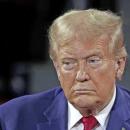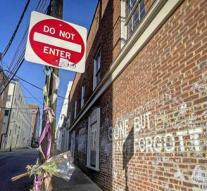

Fear and Trembling... American Town of Charlottesville Fears New Wave of Violence After Election Battle
charlottesville, virginia, united states - The town of Charlottesville in the United States is filled with fear and anticipation as it braces for potential violence following the election battle.
There have been attacks on people and properties here. Simply because they had a bumper sticker of Donald Trump on their car, or a sign with his name in the yard. There is a lot of intimidation. Everything has become more intense, more extreme.
Rob Schilling, a radio host and former Republican official in Charlottesville, is straightforward: radicalism is coming from 'the other side' in recent years. Since Donald Trump entered the snake pit of Washington, things have escalated. Especially after the deadly violence of 2017, when Charlottesville made headlines worldwide.
Extreme right and left-wing demonstrators clashed that year in the town over the city's plan to remove a monument of General Lee from the American Civil War. The bronze tribute to the commander of the southern troops, who sought to maintain slavery, was an insult to black residents.
Alt-right groups from across the country gathered to prevent its removal. A neo-Nazi rammed into counter-demonstrators. One person died and dozens were injured.
The dramatic events of that August day have since been used as a warning against political violence. This week, during the TV debate between Harris and Trump, the vice president referred to Charlottesville to highlight the consequences of choosing the Republican side. Sitting President Joe Biden also mentioned the town during his fatal debate in June, as well as in his State of the Union address. Bringing up these events touches conservatives, believes Schilling, who claims that the violence was provoked by the extreme-left Antifa. 'People are afraid to speak out,' says the community watchdog.
'What nonsense,' responds Don Gathers, a prominent Black Lives Matter activist in Charlottesville. 'In 2017, we clearly saw who the aggressors were.'
According to Gathers, the extreme right felt empowered in those days because Trump was in the White House. 'He said about the Proud Boys (a right-wing militia), 'stand back and stand by'. That was a call to be on standby!'
Silent witnesses in Charlottesville show the consequences of extremism. In the city center, the victim of the 2017 confrontation, 32-year-old Heather Heyer, is honored on the street where she died. Flowers mark the spot where the car plowed through the crowd. Walls are filled with slogans. 'Gone but not forgotten,' one reads.
Charlottesville has often been a dividing line in American history. The town in Virginia fought on the side of the Confederacy with a regiment that lost sixty percent of its soldiers during the Battle of Gettysburg in 1863. At that time, Charlottesville had twelve thousand whites and over fourteen thousand blacks. All but six hundred of the African Americans were slaves. This led to tensions, especially when many white men served far away in the army. Fear of uprising among the oppressed made the remaining white population tremble.
Segregation persisted well into the 1960s after the abolition of slavery. There were separate black schools, restaurants, and parks. The Ku Klux Klan was active in Charlottesville, with cross burnings and the lynching of an innocent black man who was accused of harassing a white woman.
Racism is still ingrained in society, says Pastor Alvin Edwards, former mayor and prominent leader of the black community in Charlottesville. As an example, he mentions the accusation that Harris is 'not smart enough'. 'This is how people think of black individuals. I don't trust Trump. If Obama did what Trump is doing, spreading hate and committing crimes, he would have been lynched. The rules change when someone is black.'
Edwards passionately defends freedom of speech and the right to protest. But do it peacefully, he says. 'What happened in 2017 is a warning for the nation. Whether a civil war is realistic, I don't know. It depends on whether Trump initiates one.'
For Democrats, the Charlottesville clash is also a possible dark omen. Republicans, in turn, point to the violence of Antifa in cities like Portland and Seattle. Both sides have their worst-case scenarios.
Resident Joe Vina believes that things will not escalate. 'We saw what happened on January 6,' he refers to the Capitol siege by Trump supporters. 'But many instigators were caught and prosecuted afterward. The movement lacks strength. I don't believe in the idea of a big angry mob.'
Many Democrats are euphoric these days after Harris's successful TV debate, as seen at a local activist gathering where volunteers write postcards to register voters. BLM activist Gathers is less optimistic. 'It's like with school shootings,' he says. 'People always think it won't happen to them. Do I think it can happen here again? Absolutely!'
Radio host Schilling also sees danger, but from the opposite side: 'I experienced hostility under President Bush as well when people were angry about the war in Iraq. Now it's much worse. After the elections on November 5th, America will have a problem, one way or another. If Harris wins, you get the same policy on steroids. If Trump wins, there will be resistance. I think chaos will break out to block his agenda.'
Thus, mutual distrust in Charlottesville is complete.


Leave a comment